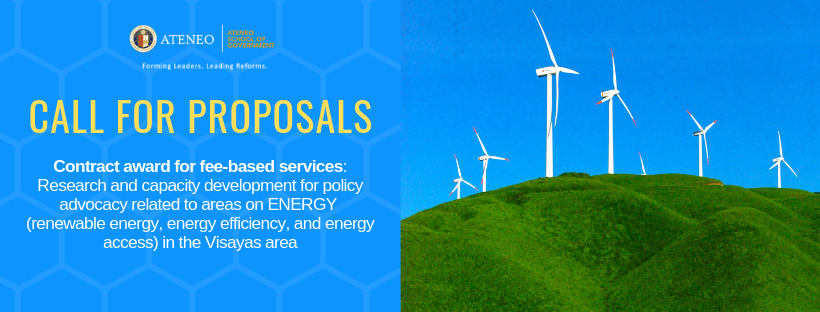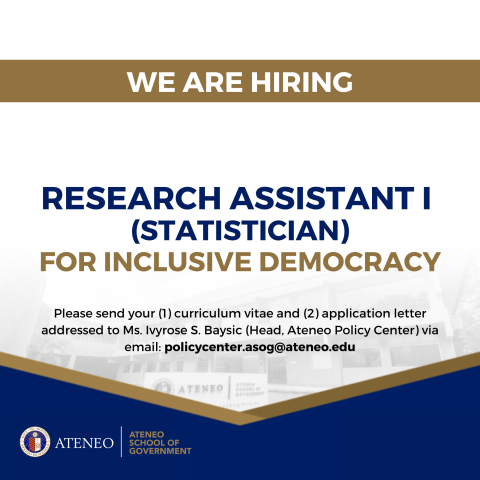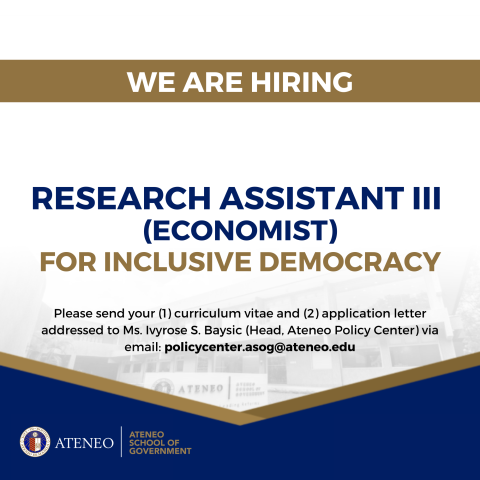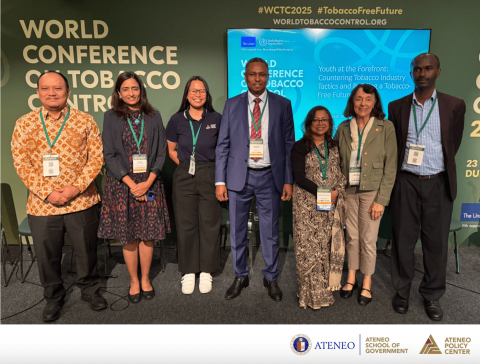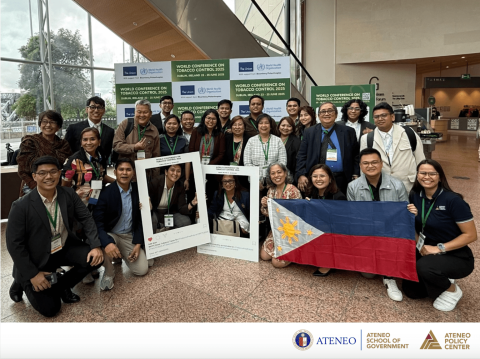CALL FOR PROPOSALS: Contract award for fee-based services: Research and capacity development for policy advocacy related to areas on energy in the Visayas area
15 Apr 2019
The Ateneo de Manila University, through the Ateneo School of Government, intends to award a contract for fee-based services to carry out research and capacity development activities that will better facilitate the country’s transition to clean energy, promote energy efficiency, and broaden energy access in the Visayas. This contract will be under the project titled “Clean Energy Living Laboratories (CELLs): The development of centers of excellence on energy access, renewable energy, and energy efficiency” current being implemented by the Ateneo de Manila University, through its School of Government. The general objective of the project is to increase the awareness and knowledge on rural electrification, energy efficiency and renewable energy, through the creation of a national Centre of Excellence for SE4All and SDG7.
About the Ateneo de Manila University - School of Government
The Ateneo School of Government (ASOG) is the public sector arm of the Ateneo de Manila University. The School’s long-term mission is to teach and work with effective and ethical public servants. It aims to contribute in building prosperous, sustainable, just, and happy communities in the Philippines, empowered by democratic, participatory, transparent, and accountable governance institutions and processes.
As a graduate school for leadership and public service, ASOG's academic and executive education programs bridge the gap between classroom wisdom and real-world policy decision- making and governance. Through its research and extension programs, and its work with public, private, and community organizations, ASOG continues to develop and foster innovative ideas and approaches in areas such as leadership, poverty eradication, climate change, social accountability, and politics.
Objectives
The beneficiary of the award will serve as the CELL for Visayas. The CELLS, as hosted by academic institutions, are connected physically and virtually supported by civil society organizations (CSOs) and private sector partners. They are envisioned to work together towards the empowerment of key stakeholders to effectively respond to energy challenges as well as seize opportunities for sustainable production and consumption through knowledge management, education and capacity building, and awareness building.
These initiatives will be executed through three mutually reinforcing and complementing pillars––(1) Knowledge Management: aimed towards undertaking studies that will address the needed reforms to set policies, programs and interventions for ensuring the country’s transition towards sustainable low-carbon renewable energy pathway, promote energy efficiency, and energy access; (2) Capacity Enhancement: to address competencies of key stakeholders to implement sustainable low-carbon renewable energy policies and programs resulting from pillar 1; and (3) Advocacy: to help create the demand and awareness for renewable energy based on the outputs that will be generated from pillars 1 and 2.
Specifically, the beneficiary should proposed activities that aim to:
1. Develop a sustainable knowledge management system that would create knowledge and foster appreciation of this knowledge for more relevant policy-making and program interventions regarding low-carbon renewable energy (RE) sources, energy efficiency (EE) and energy access (EA);
2. Create learning opportunities and build capacities of various institutions and stakeholders to better respond to sustainable low-carbon renewable energy, energy efficiency and energy access challenges; and
3. Increase public awareness and engagement in order to sustain political commitment and support to RE, EE, and EA.
The Visayas CELL is expected to work with the Luzon CELL, Mindanao CELL, and the Project Management Office to complement the Department of Energy’s Affiliated Renewable Energy Centres. Its network relationship will encourage a more robust and dynamic cross-fertilization of ideas, concepts, innovations and learning amongst network members in a more coordinated and synchronised manner. As an independent network of institutions, the Visayas CELL will help the project provide strategic and evidence-based options for government to pursue the transition towards the region’s commitment to sustainable low-carbon energy pathway more efficiently and effectively.
At the end of three years, the Visayas CELL is envisioned to be part of a self-propelling network of institutions (with strong governance and appropriate funding) and may have the capacity to expand or include other institutions and stakeholders contributing to:
- Improved learning conditions and experiences amongst various stakeholders to consistently push for more relevant low-carbon renewable energy, EE and EA policies and programmes;
- Enhanced education on innovative RE-powered technologies through partnerships with technology companies and other private sector players, and through cross-border research to share global best practices on energy innovations;
- Enhanced Low-Carbon RE and EE policies through advocacy programmes where national and local policy-makers are engaged, vet and propose improvements in laws and regulations or, as appropriate, recommend new laws and policies;
- Development of champions amongst target groups, particularly policy-makers, through education and capacity building programmes;
- Localisation of national energy plans through local government unit (LGU) engagement and capacity building;
- Increased active participation and enhanced role of women, youth and other marginalised sectors in the design and operation of activities across all partner organisations; and
- Increased income opportunities through job creation, emphasising energy as a tool to support livelihood generation.
Expected qualification of the Contractor
The following qualifications are expected of the Contractor:
- Proven expertise on research and capacity development for policy advocacy related to areas on Energy (renewable energy, energy efficiency, and energy access) in the Visayas area.
- Comprehensive knowledge of institutional frameworks, relevant stakeholders, fundamental issues and solutions to meet the growing demand for clean and affordable sources of energy for the Philippines.
- Proven experience in writing applied research on energy issues, case studies and analysis of different renewable energy systems.
- Proven expertise in quantitative and qualitative methodologies use for energy system design analysis.
Activities Supported
Aside from the coordination and logistical work in establishing and strengthening the Visayas CELL, the following activities, which would be executed by the beneficiary, are supported for the Project:
Pillar 1: Knowledge Management
This pillar will pursue a knowledge management system and apply appropriate learning models (for women, youth and children, among others) to collect, disseminate and deliver knowledge on rural electrification, energy efficiency and sustainable low-carbon renewable energy.
Activities in this pillar may include: studies that will provide evidence-base on national and local level policy-makers regarding renewable energy sources, promotion of energy efficiency, and access to low-carbon/clean energy supply; conduct of regional forums, conferences, round-table discussions, and peer information exchanges, among others to disseminate study results and other initiatives; and applied research on clean energy, energy access and energy efficiency in specific sites in the Visayas region to showcase community access and increased job opportunities.
Pillar 2: Capacity Development
This pillar is geared towards enabling key stakeholders to act as champions for promoting the advancement of sustainable low-carbon renewable energy, energy efficiency and energy access policies, programs and other initiatives.
Activities in this pillar may include: conduct of capacity needs assessment of key stakeholders in the Visayas region to meet the challenges of managing and sustaining the transition to clean energy, energy efficiency, and energy access; and enhancement of education related to energy policy and technology at par with international standards; and development of executive/short courses catering to specific knowledge and skills requirement of key stakeholders.
Pillar 3: Advocacy
The main objective of this pillar is to create demand and proactively engage key stakeholders who will champion the policy reforms initiated under pillar 1. Specific categories of champions who will be organised and developed for the purpose will include 1) media fellows who will assist in disseminating news bits, feature articles, policy briefs, etc. that will merit public interest on sustainable low-carbon renewable energy, energy access and energy efficiency; and 2) legal fellows who will assist in crafting legislative proposals that will promote a more enabling environment for clean energy.
Other activities in this pillar may include: conduct of stakeholders mapping to identify and target champions who will further the cause of the reforms initiatives generated by the CELL; organisation and mobilisation of champions in the Visayas region to engage government in discussions regarding sustainable low-carbon renewable energy, energy, and energy efficiency; publication of human interest stories on renewable energy; development of partnerships with key private sector entities such as renewable energy developers, investors, and other enablers from the region that are capable of collaborating with the government
Grant Support
Under the program, grants will be provided to knowledge management, capacity building, and advocacy activities related to Energy (renewable energy, energy efficiency, and energy access) that can demonstrate direct benefits to the communities in the Visayas region.
Grants up to PhP 6.5 million will be provided to the proposed activities with 12-30 months implementation period. The approved activities are expected to commence implementation immediately.
Applications
- Eligibility Check
- Grant beneficiaries and contractors must ensure that there is no detection of subcontractors, natural persons (including participants to workshops and/or trainings and recipients of financial support to third parties), in the lists of EU restrictive measures. The lists of persons, groups, entities subject to the EU restrictive measures are maintained by the Service for Foreign Policy Instrument and published (see www.sanctionsmap.eu)
- The Nationality Rule and the Rule of Origin must be followed. Participation in tender procedures managed by the EU External Action Beneficiary(ies), herein identified as the ADMU-ASoG, is open on equal terms to all natural and legal persons effectively established in a Member State or a country, territory or region mentioned as eligible by the relevant regulation/basic act governing the eligibility rules for the grant as per Annex a2 to the Practical Guide.
Tenderers must state their nationality in their tenders and provide the usual proof of nationality under their national legislation. If the basic act or the other applicable instruments so require, the tenderer must prove the origin[1] of the supplies acquired under the grant. Where rules of origin need to be respected[2] and the unit cost on purchase is above € 5000, contractors must present proof of origin to the ADMU-ASoG at the latest when the first invoice is presented. The certificate of origin must be made out by the competent authorities of the country of origin of the supplies and must comply with the rules laid down by the relevant Union legislation. Where supplies may originate from any country, no certificate of origin needs to be submitted.
- Proposals
- Please outline your organization’s qualifications and experience based on the following:
- Grant management experience, including with Global Fund or any previous international donor funding and with grants involving complex coordination and partnerships
- Program management experience in contracting out or implementing proposed activities
- Advocacy experience and relationships with policy makers
- Engagement and experience working in energy access, renewable energy, and energy efficiency and on the five thematic areas of the grant – financial sustainability, strategic information, service delivery, community system strengthening and enabling environment.
- Relationships and engagement with other civil society organizations and key populations
- Organizational profile (history and track record)
- Submit the following supporting documents:
- Document confirming registration and/or accreditation
- Articles of Incorporation (or equivalent)
- Strategic Plan (or equivalent)
- Mission / Vision Statement
- Organizational Chart
- Annual Report / Sample of mission reports / Financial Reports
Guiding Principles
The selection of the awardee is guided by the principles as articulated in the European Union’s External Action Guide on procurement policies:
- Value for money, ensuring a process with the best price-quality ratio, or as appropriate, to the tender offering the lowest cost and highest impact.
- Effectiveness and efficiency; ensuring time and cost-effectiveness.
- Impartiality and transparency; ensuring bidders are treated fairly and equally.
- Competition; ensuring all eligible bidders have equal opportunities.
Steps in the Selection Process
Step 1 (April 12-25, 2019) Call for Requests for Proposals issued
Step 2 (April 26-30, 2019) Assessment of proposals, eligibility and selection
- Proposal due on April 26, 2019
- Review and shortlisting
- Interview and selection
Step 3 (May 1-15, 2019) Finalization of awardee work plan, budget, and contracts
Selection Rating
Capacity Area/Selection CriteriaWeight
Program management capability and experience through direct program delivery and sub-contracting to implement partners, including monitoring and evaluation.40%
Grant management capability and experience, financial and operational management of funds and reporting.35%
Organizational governance and coordinating mechanisms.25%
General Instructions
The project concept note must be submitted by 26 April 2019 to Ms. Rosanna D. Falle (rfalle@ateneo.edu). For inquiries and additional information related to the request, you may contact the EU CELLs Project Management Office through (02) 426 6001 ext. 4643.
[1] For the purpose of this annex, the term "origin" is defined in chapter 2 of Regulation (EC) No 450/2008 of the European Parliament and of the Council of 23 April 2008 laying down the EU Customs Code (Modernised Customs Code).
[2] Under the CIR (i.e. not IPA I) and the EDF supplies may originate from any country if the amount of the supplies to be procured is below 100.000 € per purchase.
